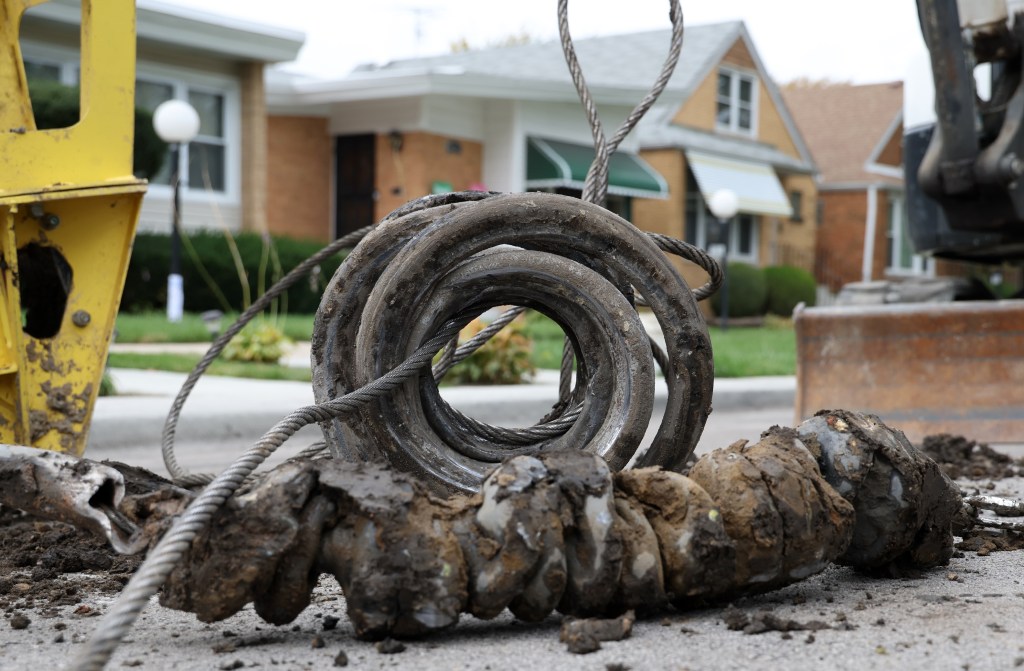Chicago’s top water officials defended Monday their decision to skirt a law requiring the city to warn nearly a million Chicagoans that their water comes from toxic lead service pipes.
Aldermen pressed Department of Water Management leaders during a City Council hearing about why the department has fallen far short of notification requirements.
The city has mailed out fewer than a tenth of the letters it was required to send by a federal notification deadline in November 2024, acknowledged Patrick Schwer, director of water quality surveillance. But he defended the decision as a practical move to spend more money on fixing pipes.
“Spending $10 million just to send a bunch of letters that people throw in their trash seems like a waste of money, especially when that money should be spent on replacing actual lead service lines,” he said.
The only way for the city to comply with federal and state notification rules would be for the city to mail letters to around 900,000 renters, homeowners and landlords, Schwer said.
Nonetheless, Schwer still touted the city’s notification efforts as a bid to be “as transparent as humanly possible” with residents. The department has sent around 75,000 letters this year to single-family homes with lead service lines, plus another 120,000 notices via billing inserts to homes suspected of having toxic lines, with more letters to come, he told the committee.
The city has also provided an online database where residents can see what materials the Water Department recorded at their address, and it offers “the most comprehensive and easiest lead-testing program in the country,” he said.
“We are open, we want to make sure that we are open and honest with every resident we have. We want them to know what we know,” Schwer said.
Chicago has more than 400,000 of the toxic pipes, by far the most of any U.S. city. Illinois has more than any other state. President Joe Biden last October ordered the city to replace every toxic pipe connecting homes to water mains within two decades.
Schwer described the notification requirements as “an unfunded mandate” as he defended the decision to not fulfill them. The city Water Department proposed not sharing the notices to the state last year, but could not come to an agreement with state officials, he said.
“Since we’ve been working with the state, we’ve been fully transparent with them about our entire procedure through this,” he said. “We meet with them monthly to give them updates on what our proposal is, how we how we’re going to meet these requirements.”
Schwer added that sending out all the required notifications would incur yet another cost: Many Chicagoans would want test kits. Around 12% of letter recipients typically ask for the kits, and it would take years to process those requests, he said.
“There are not enough physical lead-sampling bottles in the country to be able to fulfill those requests,” he said.
Schwer said the city will be compliant with federal notification rules this year, but not state rules. The city can handle 3,000 notices each week, he said, “so (residents) can feel confident in their water and we are able to respond to any of their concerns.”
Aldermen aired their frustration Monday not only with the notification process, but also with the overall pace of Chicago’s massive effort to replace the city’s lead service lines.
“We are in a crisis.” Ald. Gilbert Villegas, 36th, said as he opened the no-vote hearing. “It’s a ticking time bomb.”
Villegas estimated it would cost the city $14 billion to replace the around 400,000 lines it is required to replace, a price he said is likely to rise in time. He claimed it is four or five times more expensive in Chicago than in other cities to replace lines.
Schwer said the high cost in Chicago is in part because the city’s “different accounting” includes rehabilitation costs. “The city’s looking at every single technology we can have to reduce costs,” he added.
Originally Published: September 22, 2025 at 4:11 PM CDT
